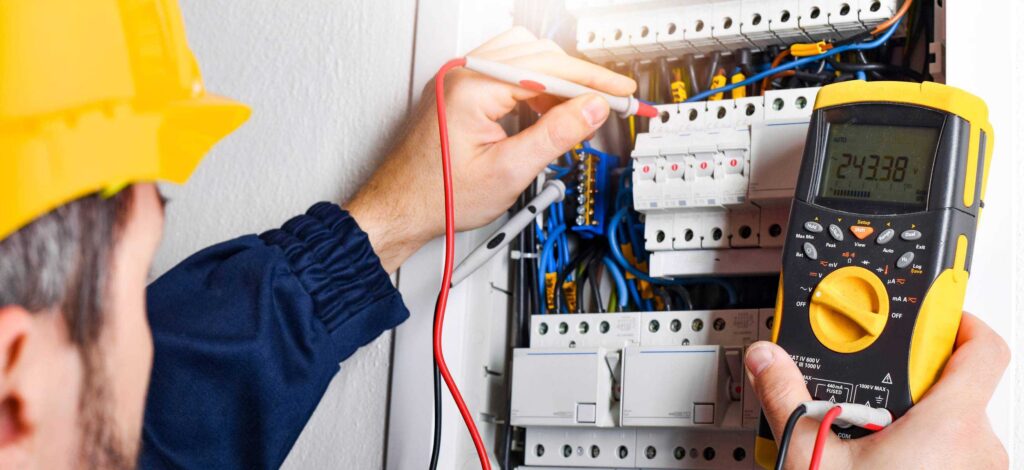One of the biggest changes in landlord legislation in 2020 was the introduction of mandatory electrical safety checks in English rental properties.
But the rules are set to change again this year – and staying compliant is key if you’re currently renting out a property, or properties, in London.
Here, we’ll explain everything you need to know about electrical safety and the rules surrounding Electrical Installation Condition Reports (EICRs).
What is an Electrical Installation Condition Report (EICR)?
An Electrical Installation Condition Report (EICR) is a detailed safety check on all electrical installations in your rental property, including:
• The consumer unit (or fuse board)
• All wiring throughout the property
• Socket installation
• Wiring on accessories
The EICR will grade your rental property’s electrical installations, outline any faults and detail the remedial work required to bring those faults up to standard.
Is electrical testing a legal requirement for landlords?
Since July 1, 2020, an Electrical Installation Condition Report (EICR) is a mandatory requirement for all new tenancies in England. Mandatory testing was already in place for Houses in Multiple Occupation (HMOs).
From April 1, 2021, an EICR will be mandatory for all tenancies in England, regardless of their start date.
So, if the tenancy in your rental property began before July 1, 2020 and you’re yet to have an EICR carried out, you’ll need to do this in advance of that April 1, 2021 deadline.
How often should electrics be checked in a rented property?
Electrical Safety Installation Reports (EICRs) are valid for five years, at which time a new test must be carried out.
EICRs must only be carried out by a qualified, competent electrician. Once the report is completed, you must:
• Provide a copy of the EICR to your tenants within 28 days
• Carry out any required remedial work outlined in the report within 28 days, or sooner if specified
• Provide proof that remedial work has been carried out to both your tenants and the local authority within 28 days of the work being completed
Fines for non-compliance
Your local authority can enforce fines of up to £30,000 if you don’t have a valid EICR for your rental property, or if you fail to carry out remedial work.
The local authority can also arrange for remedial work to be carried out if you fail to do so and can recoup their costs from you.
What does an electrical safety check involve?
An Electrical Installation Condition Report (EICR) assesses the condition and safety of the electrical systems in your rental property.
Your electrician will report whether your electrical installations are ‘satisfactory’ or ‘unsatisfactory’ and will outline work needed to bring them up to the required standards. If your electrics are rated ‘unsatisfactory’, your electrician will grade each issue with a code:
• C1 – danger present, risk of injury, immediate remedial action needed
• C2 – potentially dangerous, urgent remedial action needed
• FI – further investigation needed
If the electrician reports that your electrics are ‘satisfactory’, you’ll see a C3 grading and you’ll be issued with a valid EICR.
Landlords’ electrical safety checklist
If you’re yet to have an Electrical Installation Condition Report (EICR) carried out at your rental property, you have until April 1, 2021 to change this.
Here’s a checklist of everything you’ll need to do when it comes to EICRs…
1. Find an electrician
The person carrying out your EICR must be qualified and competent.
They should also:
• Have adequate insurance, including at least £2million public liability and £250,000 public indemnity insurance
• Have a qualification that covers current BS 7671 wiring regulations
• Have a qualification that enables them to undertake periodic testing of electrical installations
• Have at least two years of experience in carrying out electrical tests
2. Prepare for your EICR
Before your electrician carries out your EICR, you should:
• Establish where your fuse board is and ensure the electrician can access it
• Identify any existing damage to electrical installations, such as broken light fittings or switches
• Unplug any equipment so the electrician can access all sockets and fittings
3. What to expect during the test
During your EICR, your electrician will check:
• That electrical installations are not overloaded
• There are no fire or shock hazards
• There is no defective electrical work
• There is adequate earthing and bonding in your electrical installations
The EICR doesn’t cover:
• Electrical appliances like ovens, hobs, fridges or freezers
While Portable Appliance Testing (PAT) isn’t a legal requirement for landlords in England, it is best practice to have any appliances you supply as a landlord checked for safety.
4. The report and what you must do
Your electrician will provide their report once the full testing process is complete.
If the report confirms your electrical installations are satisfactory, you must:
• Provide a copy of the report to your tenants within 28 days
• Provide a copy of the report to your local authority if they request it
If your report confirms aspects of your electrical installations are ‘unsatisfactory’, it will also detail any remedial work required.
You must:
• Carry out any remedial work within 28 days of the original EICR, or sooner if the report specifies this
• Provide written proof to your tenant and the local authority that the work has been carried out within 28 days
• Retain a copy of the report
Once remedial work is complete, you won’t need to have a further EICR to confirm your installations are now safe, but you must provide proof the work has been carried out.
Further reading…
If you’re a current landlord or you’re thinking of investing in property for the first time in 2021, knowing your legal obligations is key.
Our guide outlines everything you can expect this year when it comes to landlord legislation.
Understanding your tenants’ rights is also vital to your relationship with the people renting your property, so we’ve outlined everything you need to know here.







